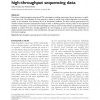Free Online Productivity Tools
i2Speak
i2Symbol
i2OCR
iTex2Img
iWeb2Print
iWeb2Shot
i2Type
iPdf2Split
iPdf2Merge
i2Bopomofo
i2Arabic
i2Style
i2Image
i2PDF
iLatex2Rtf
Sci2ools
BIB
2010
2010
Genome variation discovery with high-throughput sequencing data
The advent of high-throughput sequencing (HTS) technologies is enabling sequencing of human genomes at a significantly lower cost. The availability of these genomes is hoped to enable novel medical diagnostics and treatment, specific to the individual, thus launching the era of personalized medicine. The data currently generated by HTS machines require extensive computational analysis in order to identify genomic variants present in the sequenced individual. In this paper, we overview HTS technologies and discuss several of the plethora of algorithms and tools designed to analyze HTS data, including algorithms for read mapping, as well as methods for identification of single-nucleotide polymorphisms, insertions/deletions and large-scale structural variants and copy-number variants from these mappings.
Related Content
| Added | 08 Dec 2010 |
| Updated | 08 Dec 2010 |
| Type | Journal |
| Year | 2010 |
| Where | BIB |
| Authors | Adrian V. Dalca, Michael Brudno |
Comments (0)

